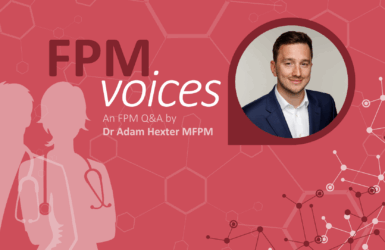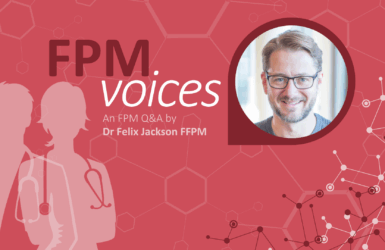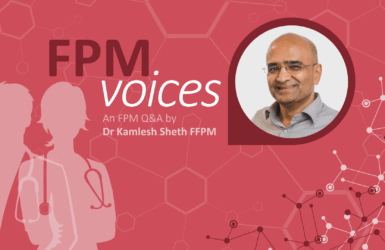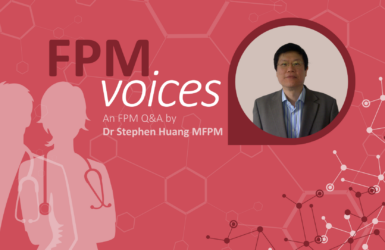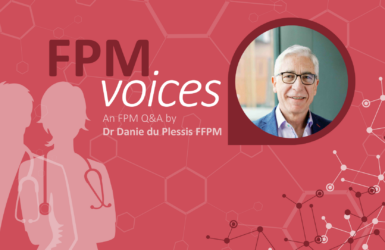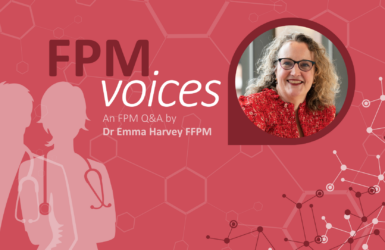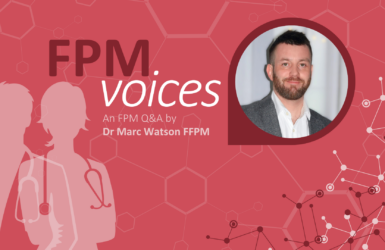Dr Adam Hexter MFPM
An FPM Voices Q&A
Posted on: Friday 27 June 2025
Author: Dr Adam Hexter MFPM
This Q&A has been prepared by Dr Adam Hexter MFPM.


FPM Voices is a Q&A interview series that shines a spotlight on the careers and insights of senior and influential pharmaceutical physicians. Through these conversations, we aim to provide colleagues with a deeper understanding of the opportunities, challenges, and rewards of pharmaceutical medicine.
Each interview explores personal career journeys, key lessons learned, and the role that the Faculty of Pharmaceutical Medicine (FPM) has played in shaping professional growth.
What first sparked your interest in pharmaceutical medicine, and what has kept you passionate about the field?
My initial exposure to the pharmaceutical industry came during my PhD at University College London, where I was involved in research grant fundraising efforts. Through this experience, I encountered the concept of Investigator Sponsored Studies, which piqued my curiosity about the broader role and functions of the pharmaceutical sector and industry.
Intrigued, I spoke with a wise friend who recommended exploring a career in medical affairs. At the time, online resources were limited, but I came across a few insightful articles published in the BMJ that shed light on the specialty. This exploration led me to discover the opportunity for formal medical training and completion of a Certificate of Completion of Training (CCT) in pharmaceutical medicine.
From that point onward, my interest steadily evolved into a passion. The dynamic and diverse nature of pharmaceutical medicine – blending science, clinical expertise, and strategic thinking – continues to drive my enthusiasm for the field.
What does FPM represent to you, both professionally and personally?
Professionally, the Faculty of Pharmaceutical Medicine (FPM) represents the cornerstone of training and accreditation in our field. It plays a vital role in facilitating Pharmaceutical Medicine Specialty Training (PMST) and in supporting the development of fully accredited pharmaceutical physicians who uphold the highest standards of medical and scientific excellence.
Personally, FPM provides a sense of belonging to a recognised and respected medical specialty – much like the Royal Colleges do for surgeons. It offers a community where I can connect with like-minded professionals and continue to grow within a specialty.
In what ways have you helped champion FPM’s mission for the next generation of pharmaceutical physicians?
As Chair of the FPM Trainees Committee, I have the privilege of representing the voice of trainees and ensuring that our experiences inform and shape the future of specialty training.
Now in my final six months of PMST, I bring first-hand insight into both the challenges and opportunities that trainees encounter. My focus has been on making PMST more enriching and rewarding for those who follow. I am committed to fostering open communication between trainees and FPM, with the aim of strengthening our training community and driving meaningful improvements.
What’s a recent innovation or lesson – whether from colleagues, patients, or scientific advancements – that has inspired or changed your perspective?
In my role in medical affairs, I recently served as the company’s medical representative during a NICE appraisal meeting. The outcome was successful: the drug received a positive recommendation for reimbursement and was subsequently made available to patients through the NHS.
This experience was deeply inspiring and the result of many months hard work. It reinforced a key reason I transitioned into pharmaceutical medicine -the opportunity to impact patient care at scale. Seeing how rigorous scientific input and collaboration can directly influence healthcare access underscored the value and responsibility of our work as pharmaceutical physicians.
How would you describe what you do to people who haven’t heard of pharmaceutical medicine?
I’m the medical expert within the company responsible for the scientific understanding and communication of a medicine. Internally, I collaborate with cross-functional teams to guide strategy, ensure scientific accuracy, and support evidence-based decision-making. Externally, I engage with healthcare professionals and other stakeholders to deepen our understanding of the treatment landscape and help generate clinical evidence to address unmet needs and evidence gaps. My role sits at the intersection of science, strategy, and patient impact.
What is one of the biggest misconceptions about pharmaceutical medicine, and how do you think we can change that perception?
One of the most common misconceptions is that doctors in pharmaceutical medicine are acting inadvertently as ‘sales representatives’. In reality, pharmaceutical physicians are typically non-promotional and deeply involved in interpreting clinical data, shaping evidence generation strategies, ensuring regulatory compliance, and safeguarding scientific integrity across the product lifecycle.
To shift this perception, we need greater visibility and education about the specialty, through outreach to medical students and clearer communication about the value we bring to healthcare. Raising awareness of PMST and the ethical / regulatory frameworks that underpin our work can help bridge this gap in understanding.
If you had to describe your job using only a movie title, what would it be?
‘The Interpreter’
In Medical Affairs, my role is often about translating – turning complex clinical data into meaningful insights for a wide range of audiences, from healthcare professionals to internal cross-functional teams. Like The Interpreter, I bridge languages: the language of science, the language of strategy, and the language of patient care.
It requires precision, clarity, and empathy to ensure that information is communicated accurately. Whether it’s interpreting emerging evidence, addressing medical inquiries, or supporting brand planning, I see my role as facilitating understanding, so the right messages reach the right people with impact.
More from this series


